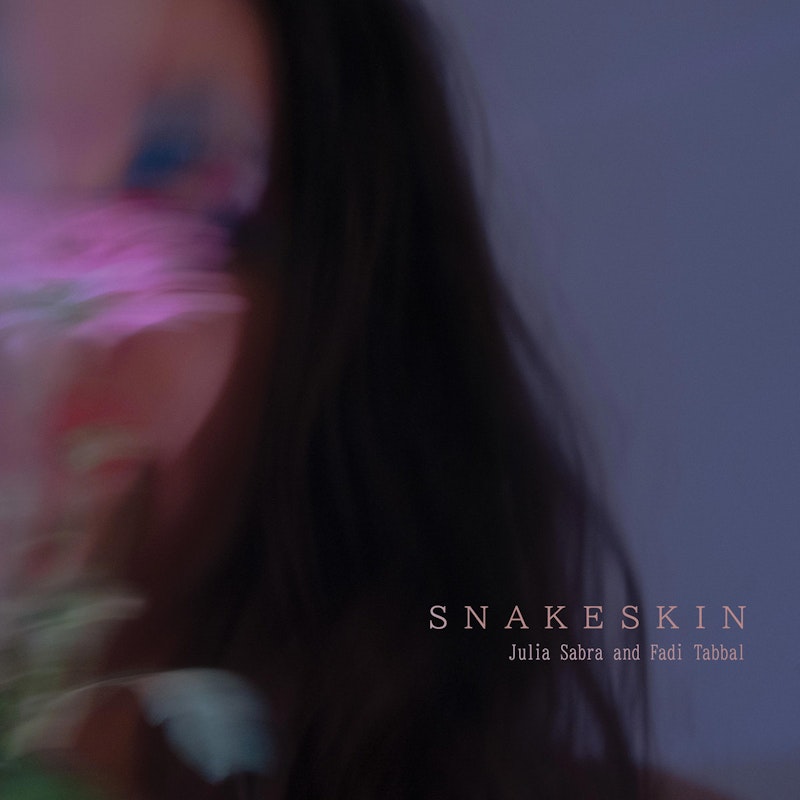Dream pop is generally somewhat upbeat and catchy. Lebanese duo Julia Sabra and Fadi Tabbal’s Snakeskin, released last fall, doesn’t exactly the genre—Tabbal’s droning synths and Sabra’s pure, sweet vocals still evoke otherworldly image, mist, and soft-focus light. But the album’s avant-garde, ambient touches flatten out the melodies and the exuberance. Instead of lifting towards ecstatic chorus or whimsical punchline, Snakeskin moves towards barren stasis—a frozen, shimmering landscape of grief, like a dream you can’t escape.
The collaboration, organized and facilitated by the Ruptured Records label, began following the 2020 Beirut Port explosion. The disaster wasn’t closely covered in the US, but it was a massive, avoidable tragedy, caused when a ship full of ammonium nitrate, abandoned due to bureaucratic failures exacerbated by Covid, caught on fire. The blast left 200 dead, 7000 injured, and 300,000 displaced and homeless. Sabra’s house was destroyed and one of her bandmates in the indie band Postcards was seriously hurt. As the album took shape, the two also addressed the Armenian invasion of Azerbaijan and the 2021 Palestinian uprising.
Snakeskin is a protest album in some ways—the title track channels a cacophonous rage. But most of the music is less about raging against the machine than about trying to figure out how to endure it as the treads roll over you. The album, they say in their notes, reflects, “the disappearance of life as we know it, and with it the decay of nature and living creatures. There is no rebirth, no renewal. It is about what it means to feel at home in such a place.”
To be at home in the land of the dead for Tabbal and Sabra means taking pop songs and turning them from catchy ditties of joy into almost-catchy hymns to paralysis. “All the Birds” builds and surges like it’s going to take off, but then the beats loop back around, throbbing on the runway. Sabra sighs in multi-tracked harmony. “A plastic dove hangs from a cypress branch/Haven’t you heard/Nothing grows here anymore/The air is burnt/Nothing grows…” Birds circle and drop to earth, as the track ends with droning feedback, sustained just long enough to be painful.
“In Our Garden” is even more ominous. Tabbal creates a horror movie industrial landscape, all dark, distant feedback with the occasional distant thud. Sabra’s voice is crystalline and clear as she makes a love song of the ugly lyrics. “Sweat and fever/puss and pain/little spiders on the stairs/get me out of here.” The second half of the song is looping synth pulses, like Vangelis running in circles around a crater. The next track, “One by One,” turns into a quasi-religious wall of crystalline echoes—Vangelis falling in that pit and vanishing in an overwhelming flash of light.
The final track, “Roots,” is 11 minutes of minor-key drift. Tabbal’s electronics honk out slow, sad notes going nowhere as Sabra’s voice is turned into a choral drone, her in-take of breath manipulated and disconnected from a sound that’s been lifted out of her body. “Rotting fruits/rusted leaves,” she repeats, as if too tired to describe the world deteriorating around her. The track refuses to transcend. It’s shoegaze that’s lost its shoes and its eyes, fracturing as it draws to a close.
Snakeskin is a morose apocalypse, and an apocalypse of the morose. It’s a lament for a world scarred by pollution and colonialism, rather than a direct call for change. But in a world where polluters and colonialists regularly insist they’re guiltless and benevolent, acknowledging loss and sadness can be a kind of resistance too. We’re all supposed to be too busy dreaming to mourn. Snakeskin insists on looking at the dead part of you that’s left behind.

